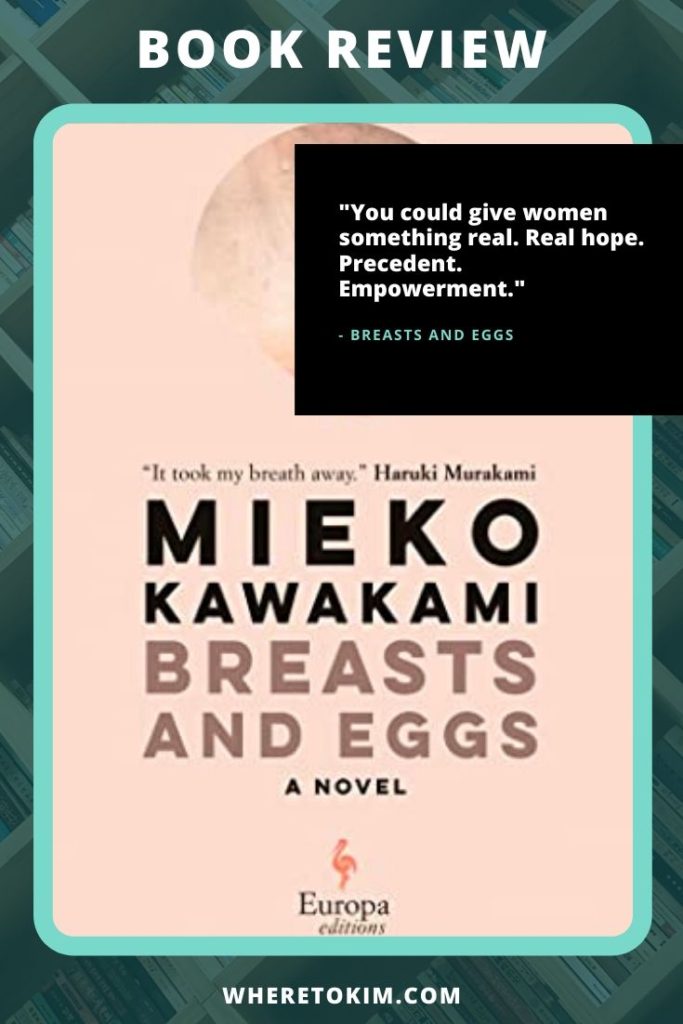“You could give women something real. Real hope. Precedent. Empowerment.” That’s the type of novel Natsuko Natsume, the main character of Breasts and Eggs, considers writing and that Japanese author Mieko Kawakami has delivered.
Location: Breasts and Eggs takes place in Tokyo and Osaka. It helps if you know the names of some neighborhoods, stations and attractions to get an idea of the surroundings.
Breasts and Eggs Synopsis
An earlier novella published in Japan with the same title focused on the female body, telling the story of three women: the thirty-year-old unmarried narrator, her older sister Makiko, and Makiko’s daughter Midoriko. Unable to come to terms with her changed body after giving birth, Makiko becomes obsessed with the prospect of getting breast enhancement surgery. Meanwhile, her twelve-year-old daughter Midoriko is paralyzed by the fear of her oncoming puberty and finds herself unable to voice the vague, yet overwhelming anxieties associated with growing up. The narrator, who remains unnamed for most of the story, struggles with her own indeterminable identity of being neither a “daughter” nor a “mother.” Set over three stiflingly hot days in Tokyo, the book tells of a reunion of sorts, between two sisters, and the passage into womanhood of young Midoriko.
In this greatly expanded version, a second chapter in the story of the same women opens on another hot summer’s day ten years later. The narrator, single and childless, having reconciled herself with the idea of never marrying, nonetheless feels increasing anxiety about growing old alone and about never being a mother. In episodes that are as comical as they are revealing of deep yearning, she seeks direction from other women in her life—her mother, her grandmother, friends, as well as her sister—and only after dramatic and frequent changes of heart, decides in favor of artificial insemination. But this decision in a deeply conservative country in which women’s reproductive rights are under constant threat is not one that can be acted upon without great drama.
Breasts and Eggs takes as its broader subjects the ongoing repression of women in Japan and the possibility of liberation, poverty, domestic violence, and reproductive ethics. Mixing comedy and realism, it is an epic life-affirming journey about finding inner strength and peace.
Book review
“You could give women something real. Real hope. Precedent. Empowerment.” That’s the type of novel Natsuko Natsume, the main character of Breasts and Eggs, considers writing and that Japanese author Mieko Kawakami has delivered.
In Breasts and Eggs, Natsuko takes the reader on a journey. We follow her as she meets with friends and family and share the moment she first realizes that she would like to have a child of her own. It is a journey towards self-discovery and a rather intimate account that reads like a personal diary. I feel like I’m spilling her secrets by writing this review.
Through the eyes of her niece Midoriko we read about a young girl’s insecurities, from having your first period to being left out. Natsuko herself is nearing her thirties and showing us the thirties dilemma: what is my purpose in life? She leads her life without a clear goal in mind and doesn’t seem happy, looking at her older sister Makiko as an example of what is to come. Makiko is looking into breast implants and will do anything to stay relevant as a hostess in a bar. While the thirty-year-old Natsuko seems rather awkward, along the way she becomes surer of what she wants in life and gradually that makes her a stronger person, even though she’s still a far cry from where the reader wants her to be.
The main characters in this novel deal with insecurities having to do with the changing female body and the question of what it means to be a woman. As Midoriko says: “It’s like I’m in there, somewhere inside myself, and the body I’m in keeps on changing, more and more and more and more, in ways I don’t even know.” She draws the parallel with a coin-operated kiddie ride at a supermarket: she’s in there but outsiders can’t see her because the windows are dark. She sounds like she wants to be seen but people aren’t looking hard enough.
For Natsuko her insecurity lies on a different level as she asks herself if she is really a woman because she is so different from other women. She has the body of a woman, but does she also have the mind of one? After the first quarter of the book, you really hope someone will volunteer to help these women and add some positive thoughts to their existence. At some point, Natsuko is intrigued by the voice of someone who found happiness; a scene that really summarized all the feelings that she expressed in the pages before.
More than anything else this book is about the empowerment of women: how to live independently from men. None of the female characters in this book have happy marriages. The married women see their husbands as an income generator and assume their husbands only see them as a baby-making machine.
The whole book is written from a woman’s perspective and I wonder if men would enjoy reading this book though if we take Haruki Murakami as an example it seems like that’s possible. Unsurprisingly, Breasts and Eggs talks about breasts, ovaries and periods; basically anything that has to do with fertility. I guess the male equivalent of this book would be about penises (enlargements and comparisons), sperm quality and first erections. Who will write a book about the empowerment of men, discussing the merits of men raising and conceiving kids on their own without needing women while dealing with their own changing bodies?
In Breasts and Eggs, Mieko Kawakami raises many questions about what’s relevant in society today. As a female reader from Western Europe, my take on them is probably very different from that of a Japanese reader as the societies we live in are not comparable. This is mentioned in the book as well. One of the questions the book raises that illustrates this is what makes donor-conceived (or IVF conceived) children different from their natural counterparts? Are they less part of a family? Is this also the case if they live with both biological parents and only the process was artificial? I think it is a very good thing that topics like artificial insemination and women taking care of themselves are discussed in this book. As both the positive and negative sides are explained it can be very informative.
This also brings me to one of the drawbacks of this book: the middle part was very tedious. While Natsuko was gathering information about the use of donor sperm, she spent less quality time with her family and friends. Reading this book sometimes felt like reading a brochure or a campaign folder. Mieko Kawakami shines when she lets her important characters interact. I especially liked the talks between Natsuko and Aizawa, a man she takes into her confidence. The bonding felt real and the scenes were beautifully written (with a very good translation by Sam Bett and David Boyd).
Kawakami is good at writing dialogues where family or lover-like feelings are involved. What the characters say is not very exciting but the words seem to come from deep within. The mere friendship or business type of gatherings are less interesting, except for that one scene with a potential sperm donor, which was brilliant. I will remember that scene for years to come.
At the end of the chapters, the scenes often became surreal but that didn’t work for me. It didn’t feel natural at all which is a pity because I really enjoy surrealism in books. This book didn’t need surrealism because the thoughts and feelings of the main characters were strong enough on its own.
I especially liked the first and last part of the book and if the middle part would have been shorter (or better) I would have rated this book higher. This book is not for everyone as the topic is very specific. If you don’t like to read about breasts, eggs, periods and getting pregnant for 400+ pages, then don’t read this book. If you are interested in a Japanese perspective on these issues, then you might find it interesting though not 100% percent entertaining.
Translated from Japanese by Sam Bett and David Boyd.
Many thanks to Picador and NetGalley for a digital ARC of this novel in exchange for an honest review.
Interested?
You can pre-order your copy of Breasts and Eggs from Amazon. The hardcover version will be available on April 7, 2020 and the Kindle version on August 20, 2020.








I’m wondering if you read this book in Japanese? It’s strange you go through a very well written review, praising the writing and language without praising the people who wrote the words you read. The translators. Please name the translators in your reviews.
Hi Susan,
You are absolutely right, and lately, I have been doing just that. My review of Breast and Eggs is one of the earliest reviews I did. I was still figuring out what I wanted to include in a review, trying out different things.
I have added the names of the translators in this review and will be updating other reviews on my site at a later date.
As for reading this book in Japanese, I wish!